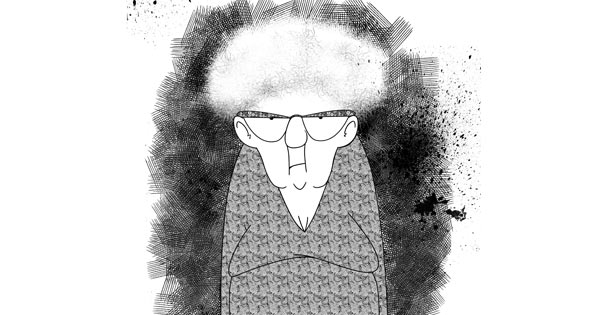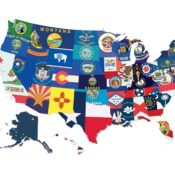“This way, girls,” said the restaurant hostess as she led my friend Barbara and me to a table. “And how are you two young ladies doing today?” she asked with a condescending smile and a voice you’d use to speak to a kitten or an infant.
“We two ‘young ladies,’”
I snapped back, “are old enough to be your grandmother, and we haven’t been girls since we were 12.”
My not-too-polite retort left the 30-ish woman looking confused and just a little hurt. (For the record, I politely explained the reason for my attitude to her before I left. She won’t be calling older women “girls” again.)
This wasn’t the first time I’d spoken up about being chronologically diminished in public. “Why did you do that?” Barbara asked.
“People have to learn that addressing us as ‘young ladies’ or ‘girls’ isn’t a compliment,”
I answered. “They might just as well be saying, ‘This way, you two old biddies.’” As far as I’m concerned, it’s just ageism plain and simple.
It’s not just women who are subjected to ageism. Men get their share. My friend Dan bemoans the fact that the grayer his hair gets, the more often he’s addressed as “young man” by servers.
Another sideways compliment that I don’t appreciate is, “Wow! You don’t look your age.” I never know how to take that one. People rarely tell a 20- or 30-something person that they don’t look their age. The way I see it, it’s just another way to point out to older people that they’re, well, older. When someone “flatters” me with this statement, I politely answer, “Well, you don’t look your age, either.” That doesn’t make much sense, which is exactly my point.
Ageism is also alive and well at doctors’ offices. I don’t know why most medical receptionists insist on addressing waiting room patients by their first name. No Mrs., Mr., Ms. It’s more than a bit disrespectful. When doctors address me with a cheery, “Hi, Karen, I’m Dr. So and So,” I greet them right back using their first name.
And if a medical professional ever uses the phrase, “Well, at your age …,” I stop them with the question, “So what treatment would you suggest for a woman of my age short of putting me out to sea on an ice floe?” That stops them cold (excuse the pun) and sometimes even leads to a less condescending and more intelligent discussion.
If I sometimes come off as a cranky old lady, that’s just fine with me. Most nations of the world respect their elders; some actually revere them. America, not so much. I frequently feel like I’m a lone voice speaking out against our youth-obsessed culture. But that’s okay. I celebrate my longevity every day, and I won’t be ignored, diminished, disrespected, or even benignly teased just because of it. I’m too old for that.
Become a Saturday Evening Post member and enjoy unlimited access. Subscribe now




Comments
Empathy and sensitivity are important in an incident like yours with the hostess, from both the receiver and transmitter. One must consider why a hostess (who is required to provide accommodation and communicate effectively and sensitively) would actively perform her job poorly. As stated in your essay, her behavior could reflect a shift in the United States’ attitude toward the elderly. But, this is unconvincing because older people are making up a higher proportion of the USs’ population. Older people still hold most of the United States’ powerful positions (heads of corporations and restaurants like the one you attended). If the hostess gets many complaints from older customers, it increases the odds that she will lose her job. Or less reasonably, she wanted to make a sly remark that only she would understand, although she could have just left the comment unspoken.
Context is important. This is probably not the first time the hostess has made this remark. The hostess may have had plenty of experience, considering that she appeared to be in her 30s when that event occurred.
Many older individuals do not notice or care about being called “young lady”, “girl”, or “young”, like your acquaintance, who did not notice the perceived transgression. Many older people appreciate the sentiment. My late grandparents preferred the mentality of vitality and exuberance, despite realistically knowing they were closer to death, that in fantasy they had the bodies and spirit of youth.
You might have been a little too quick to ascribe the act as spiteful. She most likely did not attempt to offend only you and not your friend. She likely does not have something against older people, to the point she’ll actively make sly or underhand compliments.
I agree that our country doesn’t value our elderly. They see the current person and forget that an entire life of experiences, knowledge, family/friends, and environment helped mold that person. They see the “young ladies” having lunch or the retired guy talking sports with a bunch of other old guys and never understand that their contributions have shaped today’s society. Society may be very different had those folks not gone before us.
Times have changed and old protocols broken. I call my doctors by their first names which many prefer. The security of my identity is better served by being addressed by my first name in a waiting room. “Mrs. Triflegar was at the oncologist’s, is she dying?” or “Mr. Linder was at the ED clinic, who’s he seeing at his age?” doesn’t have to spread across town. And I’m okay when someone tells me I don’t look my age because I’m pretty good looking after all these decades on earth.
Addressing people in general doesn’t seem to have changed much over the years. I remember my mother being addressed as “young lady” a decade or two ago. Now, just the term ladies is no longer acceptable in written communication. What the heck are we supposed to be called? What should we be called if girls and ladies are not acceptable? I really would not like to be addressed as “hey you”. Any suggestions?
I am also annoyed at being called “girl” or “young lady” when the speaker acts like they’re giving me a complement. I’m not talking about the genuinely friendly people who call everyone “gal” or “sweetie”, I’m talking about the condescending people who assume anyone over 40 must wish they were eternally 21.
I don’t take offense easily and always try to assume that others have the best intentions but please Knopp, rather than snarkily attacking the author, tell us why we shouldn’t feel insulted when the inference is so obviously demeaning?
Karen you make a lot of good points here. I like the one of saying ‘Hi’ along with your first name. It’s positive and respectful for addressing people without any unintended disrespect/offense, or possible interpretation of.
Lenny you make a good points too. To expand on that further, G.F., falls at ANY AGE can be disastrous or even fatal depending on the situation and severity of it. ER’s nationwide are full of young and middle-aged people falling and injuring themselves with serious body and head trauma–every day!
Much of it now is from they’re not paying attention to their surroundings due to constant smart phone ‘stupors’. In addition there are the freak accidents and other incidents where the person WAS being careful, but something unforeseen happened anyway.
G.F. Knopp. Way to go! You disagree so, rather than explain why you disagree, you digress to the ad hominem attacks.
Grumpy old thing. Good thing we have you out there to teach the public at large the proper way to speak to one another.
My, but your parents must be proud. Remembering of course that Pride cometh before a Fall – and at your age a fall could be disastrous.